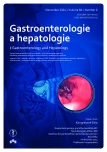Vedolizumab – a novel anti-integrin antibody with high gastrointestinal selectivity
Authors:
M. Bortlík
Authors‘ workplace:
Klinické a výzkumné centrum pro střevní záněty ISCARE I. V. F. a. s. a Interní klinika 1. LF UK a ÚVN Praha
Published in:
Gastroent Hepatol 2014; 68(6): 481-484
Category:
IBD: Review Article
doi:
https://doi.org/10.14735/amgh2014481
Overview
Development of new drugs for patients with inflammatory bowel diseases takes into consideration information on mechanisms of inflammatory response in the gut. The concept of antibodies blocking the interaction between leucocyte (integrins) and endothelial cell adhesion molecules (addressins) has resulted in development of vedolizumab, a novel monoclonal antibody against integrin α4β7. Vedolizumab acts selectively in the gut and does not affect immune reactivity within the central nervous system. Clinical trials have confirmed its efficacy for active Crohn’s disease and especially ulcerative colitis.
Key words:
vedolizumab – inflammatory bowel disease – integrin – monoclonal antibody
The author declares he has no potential conflicts of interest concerning drugs, products, or services used in the study.
The Editorial Board declares that the manuscript met the ICMJE „uniform requirements“ for biomedical papers.
Submitted:
17. 11. 2014
Accepted:
8. 12. 2014
Sources
1. Schnitzler F, Fidder H, Ferrante M et al. Long-term outcome of treatment with infliximab in 614 patients with Crohn‘s disease: results from a single-centre cohort. Gut 2009; 58(4): 492–500. doi: 10.1136/gut.2008.155812.
2. Allez M, Karmiris K, Louis E et al. Report of the ECCO pathogenesis workshop on anti-TNF therapy failures in inflammatory bowel diseases: definitions, frequency and pharmacological aspects. J Crohns Colitis 2010; 4(4): 355–366. doi: 10.1016/j.crohns.2010.04.004.
3. Lukáš M. Perspektivy biologické léčby u idiopatických střevních zánětů. Gastroent Hepatol 2014; 68(3): 225–229.
4. Von Andrian UH, Mackay CR. T-cell function and migration. Two sides of the same coin. N Engl J Med 2000; 343(14): 1020–1034.
5. Soler D, Chapman T, Yang LL et al. The binding specificity and selective antagonism of vedolizumab, an anti-alpha4beta7 integrin therapeutic antibody in development for inflammatory bowel diseases. J Pharmacol Exp Ther 2009; 330(3): 864–875. doi: 10.1124/jpet.109.153973.
6. Lazarovits AI, Moscicki RA, Kurnick JT et al. Lymphocyte activation antigens. I. A monoclonal antibody, anti-Act I, defines a new late lymphocyte activation antigen. J Immunol 1984; 133(4): 1857–1862.
7. Hesterberg PE, Winsor-Hines D, Briskin MJ et al. Rapid resolution of chronic colitis in the cotton-top tamarin with an antibody to a gut-homing integrin alpha 4 beta 7. Gastroenterology 1996; 111(5): 1373–1380.
8. Rietdijk ST, D´Haens GR. Vedolizumab for the treatment of ulcerative colitis. Expert Rev Clin Pharmacol 2014; 7(4): 423–430. doi: 10.1586/17512433.2014.911084.
9. Danese S, Panés J. Development of drugs to target interactions between leukocytes and endothelial cells and treatment algorithms for inflammatory bowel diseases. Gastroenterology 2014; 147(5): 981–989. doi: 10.1053/j.gastro.2014.08.044.
10. Sandborn WJ, Colombel JF, Enns R et al. Natalizumab induction and maintenance therapy for Crohn’s disease. N Engl J Med 2005; 353(18): 1912–1925.
11. Targan SR, Feagan BG, Fedorak RN et al. Natalizumab for the treatment of active Crohn’s disease: results of the ENCORE Trial. Gastroenterology 2007; 132(5): 1672–1683.
12. Van Assche G, Van Ranst M, Sciot R et al. Progressive multifocal leukoencephalopathy after natalizumab therapy for Crohn’s disease. N Engl J Med 2005; 353(4): 362–368.
13. Delbue S, Elia F, Carloni C et al. JC virus urinary excretion and seroprevalence in natalizumab-treated multiple sclerosis patients. J Neurovirol 2014. doi: 10.1007/s13365-014-0268-0.
14. Milch C, Wyant T, Xu J et al. Vedolizumab, a monoclonal antibody to the gut homing α4β7 integrin, does not affect cerebrospinal fluid T-lymphocyte immunophenotype. J Neuroimmunol 2013; 264(1–2): 123–126. doi: 10.1016/j.jneuroim.2013.08.011.
15. Wyant T et al. Presented at: 8th Congress of European Crohn’s and Colitis Organisation. February 14-16th 2013, Vienna, Austria. Abstract P592.
16. Feagan BG, Rutgeerts P, Sands BE et al. Vedolizumab as induction and maintenance therapy for ulcerative colitis. N Engl J Med 2013; 369(8): 699–710. doi: 10.1056/NEJMoa1215734.
17. Sandborn WJ, Feagan BG, Rutgeerts P et al. Vedolizumab as induction and maintenance therapy for Crohn’s disease. N Engl J Med 2013; 369(8): 711–721. doi: 10.1056/NEJMoa1215739.
18. Sands BE, Feagan BG, Rutgeerts P et al. Effects of vedolizumab induction therapy for patients with Crohn’s disease in whom tumor necrosis factor antagonist treatment failed. Gastroenterology 2014; 147(3): 618–627. doi: 10.1053/j.gastro.2014.05.008.
Labels
Paediatric gastroenterology Gastroenterology and hepatology SurgeryArticle was published in
Gastroenterology and Hepatology

2014 Issue 6
- Possibilities of Using Metamizole in the Treatment of Acute Primary Headaches
- Metamizole at a Glance and in Practice – Effective Non-Opioid Analgesic for All Ages
- Metamizole vs. Tramadol in Postoperative Analgesia
- Spasmolytic Effect of Metamizole
- The Importance of Limosilactobacillus reuteri in Administration to Diabetics with Gingivitis
-
All articles in this issue
- Vedolizumab – a novel anti-integrin antibody with high gastrointestinal selectivity
- OVESCO clip as a solution of an ERCP complication
- An infrequent source of gastrointestinal bleeding
- Differential diagnosis of autoimmune form of the pancreatitis and pancreatic adenocarcinoma
- Standard diagnostic and therapeutic procedure for chronic infection of hepatitis C virus
- Recommended procedure for diagnosis and treatment of chronic hepatitis B
- The report about nationwide interlaboratory comparisons of the examination of faecal calprotectin
- Autumnal conference of the Czech Hepatology Society
- Karlovy Vary gastroenterological – this year for the thirteenth time
- International professional competition Dr. Bares Award lived to see the 20th anniversary
- Thanks to reviewers
- Winter mix…
- Gastroenterology and Hepatology
- Journal archive
- Current issue
- About the journal
Most read in this issue
- OVESCO clip as a solution of an ERCP complication
- An infrequent source of gastrointestinal bleeding
- Vedolizumab – a novel anti-integrin antibody with high gastrointestinal selectivity
- Karlovy Vary gastroenterological – this year for the thirteenth time
